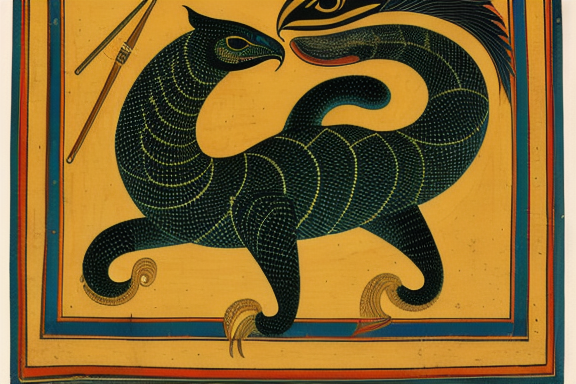In Greek mythology, Medusa is a well-known figure associated with her infamous snake-like hair and the ability to turn people to stone with a single gaze. Her appearance is often depicted as a monstrous creature with a head full of writhing serpents, a terrifying sight to behold. However, despite her prominent role in mythology, many people wonder if Medusa is mentioned in the Bible.
The question of whether Medusa is mentioned in the Bible is a common one, considering the rich mythology and numerous legendary figures found within its pages. However, it is important to note that Medusa is not specifically mentioned by name in the Bible. The Bible primarily focuses on the religious and historical events of the ancient Near East, with an emphasis on the relationship between God and humanity.
While Medusa may not be directly referenced in the Bible, there are biblical passages that touch on similar themes of divine punishment, transformation, and the consequences of disobedience. These passages often serve as cautionary tales or moral lessons, illustrating the importance of staying faithful to God and avoiding sinful behaviors. The story of Medusa, with its themes of punishment and transformation, may resonate with some biblical narratives, but it is important to recognize that the two are distinct and separate sources of mythology and religious teachings.

Medusa in Mythology
In Greek mythology, Medusa is one of the most well-known figures, characterized by her striking appearance and fascinating backstory. She is often depicted as a monstrous creature with snakes for hair and a gaze that turns people to stone. Let’s delve into the detailed origins of Medusa, her transformation into a Gorgon, and her role in various myths and legends.
Origins of Medusa
The story of Medusa begins with her lineage. She was one of the three Gorgon sisters, born to the sea gods Phorcys and Ceto. Medusa, along with her sisters Stheno and Euryale, was known for her terrifying appearance and the ability to turn anyone who looked into her eyes to stone. However, Medusa’s origin story takes an interesting turn.
According to the most well-known version of the myth, Medusa was originally a beautiful mortal woman. She caught the attention of the sea god Poseidon, who seduced her in the temple of Athena. Enraged by this sacrilege, Athena transformed Medusa’s beautiful locks into a tangle of hissing serpents and cursed her with the power to turn anyone who gazed upon her into stone.
**This transformation into a monstrous Gorgon was a punishment for Medusa’s perceived transgression**. It is worth noting that Medusa’s transformation highlights the themes of beauty, jealousy, and divine retribution that are prevalent in Greek mythology.
Medusa’s Role in Myths and Legends
Medusa’s story intertwines with various Greek myths and legends, making her a significant figure in mythology. One of the most famous tales involving Medusa is the story of Perseus, the hero who slayed her.
In this myth, Perseus is tasked with beheading Medusa and bringing back her head as a gift to the king. With the help of the gods, Perseus succeeded in his quest by using his mirrored shield to avoid looking directly at Medusa. He then swiftly decapitated her, and from her severed neck sprang the winged horse Pegasus and the giant Chrysaor.
**Medusa’s head became a powerful weapon**, capable of turning enemies to stone and offering protection to those who possessed it. Perseus later used it to defeat other adversaries, including the sea monster Cetus and the titan Atlas.
Medusa’s image and symbolism have permeated various aspects of art, literature, and popular culture. From ancient Greek pottery to modern-day movies and video games, her iconic visage continues to captivate and inspire. Her story serves as a cautionary tale about the consequences of hubris and the power of divine punishment.
The Bible and Medusa
While Medusa is a well-known figure in Greek mythology, there is no direct mention of her in the Bible. However, when examining biblical texts and references to creatures similar to Medusa, one can find intriguing parallels and connections.
In the book of Isaiah, there is a mention of a creature called “Leviathan,” which is described as a sea monster with scales and a terrifying appearance. The description of Leviathan’s scales brings to mind the serpentine nature of Medusa’s hair. Furthermore, in the book of Job, there is a reference to a creature called “Rahab,” often associated with chaos and the sea. Some scholars suggest that Rahab could be linked to the mythical figure of Medusa.
Interpretations and theories linking Medusa to biblical figures vary, and it’s important to note that these connections are speculative in nature. However, they offer a fascinating insight into the interplay between ancient mythologies and biblical narratives.
When exploring the influences of ancient Near Eastern cultures on biblical texts, we find that serpent-like creatures and figures with snake-like attributes are not uncommon. In various ancient Near Eastern mythologies, serpents were often associated with chaos, danger, and fertility. These cultural influences could have seeped into the biblical narratives, giving rise to the imagery of creatures resembling Medusa.
It is worth noting that the Bible draws from a wide range of sources, including cultural and mythological elements from the surrounding regions. The inclusion of creatures similar to Medusa in biblical texts serves as a testament to the rich tapestry of influences that shaped the development of biblical literature.

Conclusion
Throughout this exploration of the connection between Medusa and the Bible, we have delved into the significance of Medusa in mythology and examined various biblical references and theories. It is important to note that there is no direct mention of Medusa in the Bible. However, we have uncovered intriguing parallels and connections that invite further contemplation.
Medusa, in Greek mythology, is renowned for her petrifying gaze and serpent-like hair. She has become a symbol of feminine power, transformation, and allure. While her story is not explicitly mentioned in the Bible, the Bible does contain references to creatures and figures that share similarities with Medusa.
One such example is the serpent in the Garden of Eden, which tempts Eve and plays a pivotal role in the fall of humanity. The serpent’s ability to deceive and its association with knowledge and temptation align with some aspects of Medusa’s character. Additionally, the biblical Leviathan, a sea monster of great power and ferocity, bears resemblance to the monstrous nature often associated with Medusa.
It is worth noting that interpretations and theories linking Medusa to biblical figures are speculative in nature and subject to individual analysis. The connection between Medusa and the Bible is a topic of ongoing discussion and debate among scholars and theologians. While some may find compelling parallels, others may view them as mere coincidences or symbolic associations.
While Medusa herself is not explicitly mentioned in the Bible, exploring the potential connections and shared themes between Medusa and biblical figures provides a fascinating lens through which to examine the richness and complexity of biblical narratives. It serves as a reminder of the enduring influence of mythology and the diverse ways in which ancient stories continue to resonate with contemporary interpretations.

Rockin’ the faith, one verse at a time!
Growing up, the Bible’s stories deeply impacted me. Now, with over 15 years of preaching experience, I blend timeless teachings with modern technology, making them relevant for today’s world.
Bible Hub Verse is my platform to share historical insights and thought-provoking articles, exploring both familiar and uncommon Christian topics. My passion is building a welcoming online space for everyone to learn, grow in their faith, and discover the Bible’s enduring message.
Join the journey!
God bless you.









